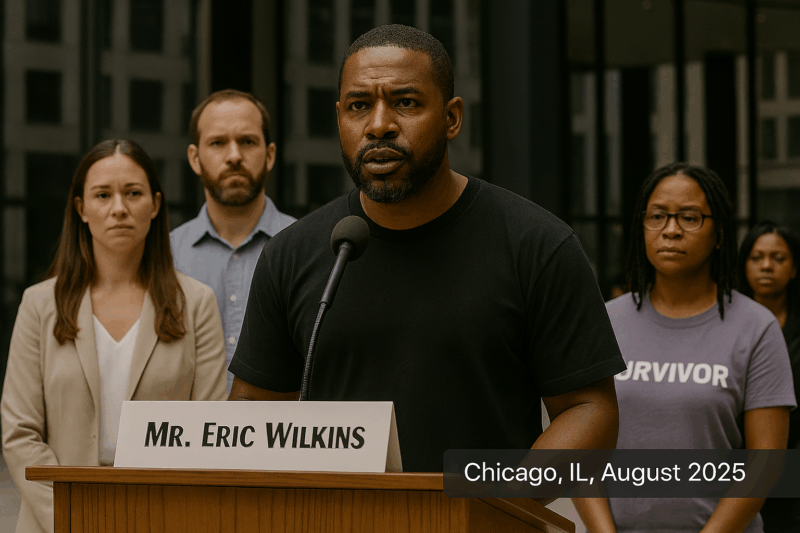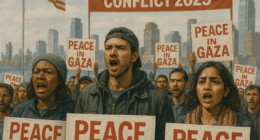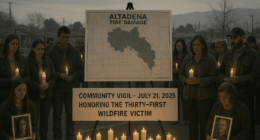On August 26, 2025, Chicago gun violence survivors, including Eric Wilkins, a 54-year-old anti-violence organizer paralyzed in a 1999 shooting, publicly condemned President Donald Trump’s threat to deploy National Guard troops to the city. Speaking at a Federal Plaza press conference organized by One Aim Illinois, survivors and advocates called for reinstating $158 million in federal funding for community-based violence prevention programs instead of militarized intervention. This blog, based on a Chicago Tribune report, explores the human impact, key details, legal context, and implications of their opposition amidst Chicago’s declining crime rates.
Human Toll
The threat of National Guard deployment has heightened fear among Chicago’s communities, particularly in Black and Brown neighborhoods like Roseland, where Wilkins works. Survivors like Wilkins, who mentors at-risk youth through Communities United, worry that militarized policing will escalate tensions and reverse progress in reducing gun violence. Parents, such as Englewood resident Tameka Harris, express concern for their children’s safety, fearing troops could target minority youth. The April 2025 cut of $158 million in federal violence prevention grants has strained organizations, with 12 Chicago groups downsizing and 45 staff laid off, impacting community trust and mental health support for survivors.
Community and Advocacy Response
Advocates, including Live Free Illinois’ Artinese Myrick and Rev. Ciera Bates-Chamberlain, argue that deploying troops sends a message that Black communities are “problems to be controlled” rather than supported. They highlight community-led solutions like jobs programs and wheelchair sports, which have helped survivors like Wilkins rebuild hope. A WBEZ poll on August 25, 2025, found 78% of Chicagoans oppose the deployment, reflecting widespread community resistance.
Key Facts About the Controversy
- Trump’s Plan: On August 22, Trump announced Chicago as a potential target for National Guard deployment to address crime, following deployments in Washington, D.C. (2,000 troops) and Los Angeles (4,000 troops, 700 Marines). He called Chicago a “killing field,” citing a weekend with 6 deaths and 27 injuries, though Chicago police corrected this to 3 fatalities.
- Crime Statistics: Chicago police data shows a 36% drop in shootings, 31% in homicides, and 35% in robberies in 2025 compared to 2024, with homicides at 262, the lowest since 2014.
- Survivors’ Stance: At the August 26 press conference, Wilkins and others demanded reinstatement of $811 million in nationwide violence prevention grants cut by Trump, emphasizing grassroots solutions like youth employment and mental health services.
- Local Opposition: Mayor Brandon Johnson and Governor JB Pritzker reject the deployment as unconstitutional, citing no emergency and no White House communication. They argue it’s a political move targeting Democratic-led cities.
Legal and Social Context
The Posse Comitatus Act of 1878 restricts federal military use in domestic policing unless authorized by Congress or the Insurrection Act, which Trump has not invoked for Chicago. Unlike D.C., where federal control is easier, Illinois’ National Guard requires Pritzker’s consent or federalization, which experts like the Civic Federation’s Joe Ferguson call illegal without a clear emergency. Chicago’s success with community violence intervention (CVI) programs, like Chicago CRED, which reduced rearrests by 73% per Northwestern University studies, contrasts with Trump’s cuts to 69 CVI grants. Critics, including Rep. Hakeem Jeffries, argue Trump’s focus on Black-led cities like Chicago and Baltimore reflects partisan motives, not crime concerns, as red states have higher murder rates.
Why This Matters
The proposed deployment threatens to undermine Chicago’s progress in reducing violent crime through community-led efforts, risking escalation in neighborhoods already grappling with historical disinvestment. Survivors like Wilkins emphasize that solutions like jobs and mental health support are more effective than militarization, which could retraumatize communities. The controversy also tests federal-state power dynamics, with potential legal battles looming if Trump federalizes the Illinois National Guard.
What Lies Ahead
No formal deployment plans have been confirmed as of August 26, 2025, but the Pentagon reportedly plans to mobilize thousands of troops by September. Johnson’s legal team is preparing for court challenges, supported by Illinois AG Kwame Raoul, who calls the move authoritarian. Advocacy groups are organizing a Labor Day rally to protest the deployment and federal cuts to Medicaid and violence prevention. If Trump declares a national emergency, as suggested, he could extend deployments indefinitely, escalating tensions. Community leaders urge reinvesting in CVI programs, noting their proven impact over militarized approaches.
Conclusion
Chicago gun violence survivors, led by Eric Wilkins, reject Trump’s National Guard deployment as a “bully tactic” that threatens community progress. With crime rates dropping significantly, their call for restored federal funding and grassroots solutions resonates widely. As Chicago braces for potential federal overreach, residents are urged to support community-led initiatives like One Aim Illinois and stay informed through trusted sources like the Chicago Tribune. The fight for public safety and local sovereignty continues amidst this contentious debate.






